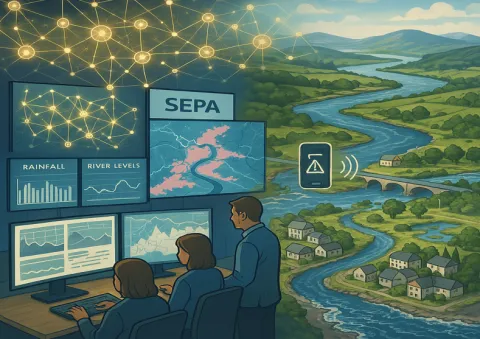
CREW Code: CSPF2025_01
Theme: Hydrological Extremes, Coasts and Risk Management
Project status: Project complete. Click here to visit the publication page to view the project outputs.
Type of project: Science Policy Fellowship
Lead research team: University of Strathclyde
Flooding is a growing concern in Scotland with climate change increasing the risk and frequency of extreme events. In Scotland, the Scottish Environment Protection Agency (SEPA) is the body responsible for flood forecasting. Accurate flood forecasting plays a vital role in helping communities prepare, respond, and stay safe. This DelugeAI project explored how Artificial Intelligence (AI) and Machine Learning (ML) could improve SEPA’s flood forecasting capabilities.The project led by the University of Strathclyde reviewed recent research, studied real-world applications, and consulted international experts and industry leads to find out how AI/ML is supporting current forecasting tools and what are the implementation challenges. The review was framed around seven stages in the flood forecasting chain, from monitoring to generating early warnings.
Based on the review, the team undertook a feasibility study to establish how easily AI/ML can be implemented into SEPA’s current operations. It highlighted that the strongest opportunities are in improving early warnings and supporting decision making. In an operational setting, AI/ML is likely to be most useful when it works alongside traditional forecasting approaches, rather than replacing them. AI/ML can also help integrate enhanced weather forecasts, improve data collection in remote areas, and calibrate existing forecasting models. However, these advanced uses will require more time, investment, and careful testing before a final decision on their adoption can be made.
Drawing from these findings, this DelugeAI project recommends that, subject to wider value for money tests, SEPA take a phased approach starting with introducing simple AI tools, including generative AI, then building to improve early warning and decision support systems. It also highlights the need for clear communication, good quality data, and ongoing human oversight to ensure forecasts remain trustworthy and effective.
By responsibly integrating AI and ML technologies, Scotland can strengthen its flood forecasting capabilities, protect communities more effectively, and build resilience in the face of a changing climate.
This project has completed. Click here to visit the publication page to view the project outputs.